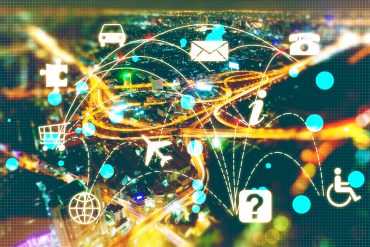
Applied AI offers the opportunity to strike a balance between productivity and the daily complexities of field operations.
Over the past year, we’ve seen a groundswell in AI momentum, and hype is at an all-time high. According to the Gartner Hype Cycle for Emerging Technologies, AI currently sits at the ‘Peak of Inflated Expectations’ and is projected to reach transformational benefit within two to five years. As the technology continues to establish itself, we’ve seen the emergence of differentiated categories of AI. One of these is ‘Applied AI,’ which can be described as the branch of AI that brings the technology out of the lab and into the real world. Applied AI has the potential to deliver transformational benefits within a much shorter time frame – in fact, it’s already doing that.
Enterprises and organizations that have become early adopters of Applied AI are already seeing the benefits and the huge potential for future applications across their operations. Some of the greatest initial innovations are taking place in sectors such as oil and gas production, healthcare, and manufacturing across a wide variety of applications, including predictive maintenance, optimization of operational processes, and enhanced safety practices.
The role of Applied AI in predictive maintenance
Applying the principle that prevention is better than cure, predictive maintenance has been widely adopted in heavily mechanized sectors such as oil and gas, where breakdowns or faults can be largely anticipated. Using sensors in combination with Applied AI, the state of assets and equipment can be monitored and analyzed. The variety of data generated by sensors and other sources can be used to develop complex models that provide insights into equipment and asset status, along with its utilization. The great leap forward that is achieved in this application of Applied AI is that data generated in normal operations can be analyzed, and more accurate maintenance regimes can be implemented.
Applied AI in this scenario can reduce the probability of failures and give far superior insights into the likelihood of failure over a given time and the remaining lifetime of an asset. These capabilities create new possibilities and make it a better option for preventative maintenance, which is dictated by rules. Its accuracy lets oil and gas operators avoid unnecessary maintenance that can result in costs and downtime.
See also: ChatGPT Bandwagon and Other Mistakes Companies are Making with AI in Automation
Optimizing operational processes at the edge
By implementing Applied AI solutions, organizations have an opportunity to strike a balance between productivity and the daily complexities of field operations. The healthcare sector is one that stands to reap very significant benefits from such solutions. Applied AI offers a real opportunity to automate some of the problem-solving carried out by medical professionals and to help them make quicker, better decisions and apply problem-solving techniques that humans alone could not. This will result in outcome-driven healthcare.
To achieve this, tailored AI models are designed to enhance patient care and drive cost efficiency, ultimately delivering measurable improvements to healthcare operations. An emerging paradigm in the field of AI that can speed the delivery of these models is Declarative AI, which focuses on developing a series of AI functions by combining traditional analytics, machine learning, and advanced deep learning techniques. This approach aims to create intelligent systems that can adapt to a wide range of use cases and generate meaningful insights from complex data sets.
Declarative AI facilitates consistency, efficiency, and scalability, enabling the seamless deployment of robust AI solutions tailored specifically for the healthcare industry’s intricate requirements. By combining traditional analytics, machine learning, and deep learning techniques, it offers a higher level of abstraction and flexibility, enabling the creation of customized AI solutions that can address specific business needs and provide a competitive advantage in the rapidly evolving world of artificial intelligence.
Examples of how Applied AI can deliver real benefits to the healthcare sector include:
- Emergency Room Utilization and High-Use Patient Prediction – hospitals gain the capacity to optimize staffing and resource allocation, leading to enhanced patient outcomes and a reduction in overcrowding within their emergency departments. This predictive approach ensures efficient operations while prioritizing patient care and safety.
- Predict Patient Hospitalization Term, Identify Reductive Factors – hospitals and insurers can proactively allocate resources, reduce hospitalization rates, and improve patient care by addressing root causes.
- Predict Claims Severity from Initial Admission – Insurers can proactively assess claim costs at the outset, enabling more informed resource allocation and precise pricing strategies. This proactive approach results in substantial reductions in overall claim costs while optimizing operations.
- Rapid analysis of X-rays and NMR images can improve diagnosis and patient outcomes in a cost-effective way.
Enhancing safety practices
Workplace safety is another area that stands to benefit immensely from Applied AI solutions, which are capable of leveraging the insights and learnings from other safety events and adjusting to hazards. There are many ways that Applied AI can be deployed to workplace safety, including risk identification, near-miss detection, task automation, and the provision of real-time feedback for workers to further reduce risks.
In potentially hazardous settings such as manufacturing, warehouses, and oil and gas facilities, for example, Applied AI has great potential to reduce safety incidents. An AI-driven innovation that is showing real promise is computer vision technology. When combined with existing CCTV systems, footage can be analyzed by an Applied AI application to identify workplace hazards, dangerous behavior, and other potential risks. It can also monitor the condition of machinery and safe usage and detect potential safety issues.
Applied AI can make workplaces safer for workers and, in doing so, deliver financial benefits to employers by reducing the risk of fines and litigation. It can also reduce workplace injury rates, thereby increasing productivity.
The promise of Applied AI
While the future is unclear and the hype surrounding AI is plenty, Applied AI holds transformative potential for many complex industries. It has the capability to hold great operational efficiencies, innovation, and profitability. For it to be successful, though, it requires a strategic, outcome-focused approach coupled with the adoption of Declarative AI models. By deploying Applied AI solutions, companies and organizations can unlock new possibilities, driving forward innovation, efficiency, and success across a wide range of sectors.




























